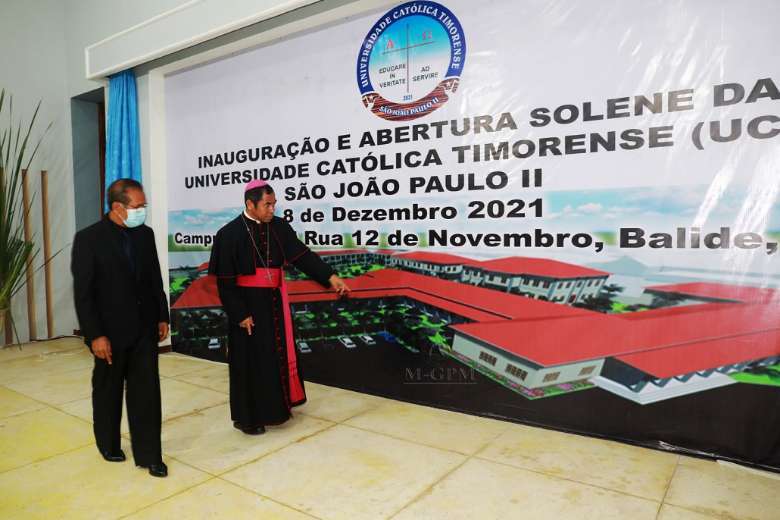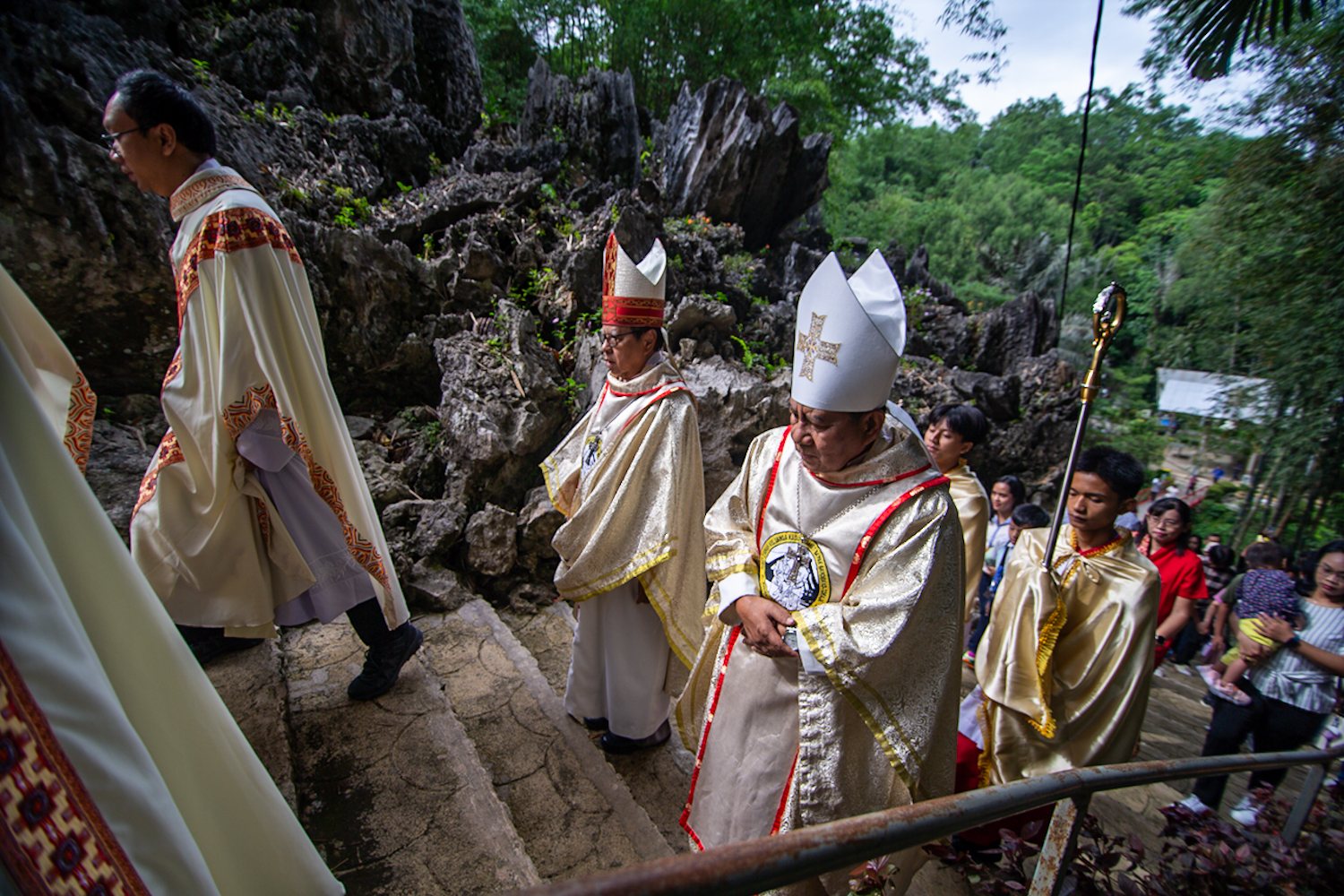Marco Carvalho
The University of Saint Joseph (USJ) will collaborate with Saint John Paul II Catholic University, a newly established East Timorese higher education institution. As soon as the epidemic scenario allows travel to resume, USJ intends to institute exchange programs with East Timor’s Catholic University for students and teachers alike.
Formally created on December 8th, on the Feast of the Immaculate Conception, the new higher education institution – affiliated with East Timor’s Catholic Church – recently inaugurated its first recruitment process. The University will start operating with fifty teachers and intends to reinforce the teaching staff with visiting professors from Portugal, Macau, Indonesia and Brazil.
The University of Saint Joseph will be one of the partners of the newly established Saint John Paul II Catholic University, Professor Stephen Morgan told O Clarim in an exclusive interview. The Welsh deacon also lifted the veil on the future of the relationship between the University of Saint Joseph and Universidade Católica Portuguesa, the Portuguese Catholic University.
Last month, you attended a meeting of the High Council of the Portuguese Catholic University. What sort of matters were discussed concerning the partnership between Católica and USJ?
I attended the High Council – Conselho Superior – of the Universidade Católica Portuguesa because, as Rector of the University of Saint Joseph I am an ex officio member of that Council. This underlines the closeness of the relationship of our two Universities. In fact, it was the eighth meeting of the Council that I have attended, albeit my attendance at the previous seven had to be online because of the COVID-19 pandemic. Even now many of the members based in Portugal also attended online, not just because of the pandemic, but because some are located away from Lisbon: at the campuses in Porto, Viseu and Braga, for example. At this meeting we did not specifically discuss the University of Saint Joseph in any detail. It was a meeting specifically to deal with other matters. The University of Saint Joseph is a standing item on the agenda for one of the other meetings in the year. I was able to brief the Council on developments since my last formal report, including the matter of the permission to recruit Mainland students.
A USJ press release mentions that you have explored with Mrs. Isabel Capeloa Gil the development of joint programmes between the two universities. In which areas should we expect that partnership to be reinforced?
Our Bachelor of Christian Studies degree is already part of a joint programme with the Theology Faculty. It has been a great success and one on which we are keen to build. In October 2019 – just before COVID-19 – a group of us from the University of Saint Joseph travelled to Portugal to begin that process but, of course, it was later interrupted by the pandemic. Professor Gil and I discussed areas in which – as things get back to some sort of normality – we want to move forward. Looking at the strengths of our two universities, the areas of business, digital media and arts, data science and environmental science look like very promising areas.
Will the two universities launch any new joint degrees in the coming years?
That will depend on how the discussions develop in those areas I have outlined above. I would hope so but aligning the various regulatory regimes means that the precise form that might take in particular cases may differ.
You have also discussed the exchange of academic staff and students. This mechanism was hindered by the pandemic, but what can we expect from the future?
We did discuss this. Historically, the University of Saint Joseph has benefited enormously from academics (and other staff) coming to us from UCP. Some have come for short periods, others for a semester or for several years. There has been less traffic in the opposite direction but several members of the USJ staff have had regular visiting appointments at Católica, which they have managed to keep up through the last two years by a combination of on-line teaching and travel to Portugal – given that this latter option has meant that they’ve had to do quarantine on returning to Macao, I think they have been very generous in doing so. Professor Gil and I talked about a number of ways in which this aspect might become serious two-way traffic. For our early-career academics the opportunity of more or less regular appointments to teach or research for a semester in the other institution seems like a very promising area.
While in Portugal, you have visited Catolica’s brand new medical school, a facility sponsored by Chinese group Fosun. Now that the University of Saint Joseph was allowed to recruit students in Mainland China by Chinese authorities, this sort of sponsorship would be welcome by the University?
The new Medical School at Sintra is an amazing facility. Quite apart from the state of the art technology that it boasts, the entire practice-orientated, real-life problem-solving approach allows for students to learn and train in a much more integrated manner than in traditional medical schools. The support of Fosun Group – through its Portuguese subsidiary Luz Saúde – has been crucial to making this a success. I certainly hope that USJ is able to benefit from that relationship and forge similar collaborations as time goes on.
Did USJ already recruit any students from Mainland China? If so, how many?
The permission to recruit was granted after the current academic year had started and we only recruit for second semester starts on a very few programmes. We are, therefore, very much focussed on the forthcoming round of admissions, for September.
The East Timor Church launched its very own Catholic University in early December. Will the University of Saint Joseph cooperate with this new Timorese higher education institution?
I was delighted to see the launch of East Timor’s Catholic University. The University of Saint Joseph has had many students from East Timor and they have always been a joy to teach and credit to their country. We will, of course, seek to collaborate with and support this new venture, both directly, when travel permits, and through participation in, for example, the International Federation of Catholic Universities.
Now that there is already a door open to the People’s Republic of China, will the University of Saint Joseph launch any new degrees in order to tap the potential of the Chinese market?
In the initial, trial period of our permission we need to concentrate on those areas of study that the Central People’s Government have identified. If we do that well and demonstrate our sincerity, I hope that this will open up opportunities for more areas of study and for new programmes that respond appropriately.
(Photo: UCANews)


 Follow
Follow


